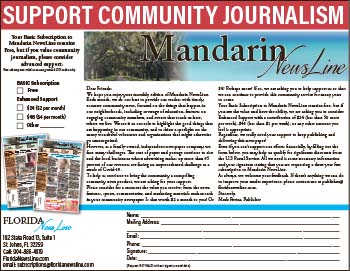By Master Gardener Volunteer Lesley Arrandale
mail@floridanewsline.com
Happy New Year! I don’t know how many of you read my gardening column, but I hope you find it useful. As well as discussing current topics and pointing out resources for you to investigate further, I hope it encourages you to think outside your “box.” Whether you tend a regular city lot, 20 acres, or a patio or window box, the natural world has so much to offer.
It’s timely this month to tell you that a potentially deadly disease called sugarcane mosaic virus has been detected in turf grass in southeast Duval County. If you value your lawn I strongly suggest you read this article: http://tinyurl.com/2dyunyzt. Up until recently this virus was only found farther south, but since it’s impossible to treat its spread has been inevitable. As you will see, using clean machinery is particularly important as the virus can be spread from yard to yard when maintenance crews use contaminated mowers. It’s important to discuss this with your yard service.
To keep your turf resilient, follow best cultural practices: mow at the correct height, only water as needed, and don’t over fertilize (http://tinyurl.com/uesyxdd8). At this time of year, mowing is not a once-a-week task and watering should be done as needed. (If your home address has an odd number, or has no address, you may water on Saturdays. If your home has an even numbered address, you may water on Sundays.) Note that a brown winter lawn is not necessarily a dead lawn. Grasses can go dormant like many other plants, and green up in spring with warmer weather.
Also recently, the USDA has updated the zones that help us determine what perennials and woody plants can be grown in our area (https://planthardiness.ars.usda.gov/). Most of Duval County immediately along the St. Johns River and eastward has been reassigned to Zone 9b, moving us up a category from 9a. This reflects changing temperature patterns. Historically our average last frost date has been around March 16, but will probably be a little earlier on average. Don’t be lulled into thinking your garden is safe from late frosts. If you make an early start, always be prepared to protect spring crops and tender seedlings according to the weather forecast. Check out this section of the USDA website for further guidance: http://tinyurl.com/bddhy8y3.
If you have questions and problems, contact our Extension Service for advice. Master Gardener Volunteers are available from Monday to Friday, 9 a.m. – 12 p.m. and 12:30 p.m. – 3:30 p.m., at (904) 255-7450. Alternatively, you can send emails, including photos, to duvalmastergardener@gmail.com. This is especially helpful if you are dealing with something like an insect or leaf problem.
Extension newsletters include: A New Leaf – Yard and Garden (http://tinyurl.com/55czsu7e) and The Neighborhood Gardener (http://tinyurl.com/m6svefn). Throughout the year Extension specialists offer classes both online and in person at 1010 North McDuff, and around town at various venues. There are two major events in spring: A Day of Gardening on Feb. 24 and The Master Gardener Volunteer plant sale on March 29 and 30. All programs will be announced in A New Leaf.
Gardening helps me understand where I fit in the natural world, discover what other creatures share my space, and how I can help, or hinder, them as they go about their lives. Small organisms that inhabit the soil we cultivate and the birds and other animals that visit from the dwindling natural areas dotted around town, increasingly need help from gardeners. So it is my “Hope” that more people discover what is going on around them in their yards and gardens, and learn how to make a difference.








